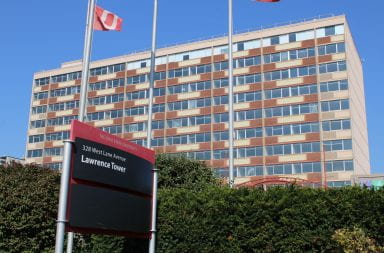A once booming factory on the east side of Weinland Park is now an eyesore for the community.
The former Columbus Coated Fabrics plant on North Grant Avenue, which employed more than 2,000 people in its heyday, sat empty for nearly two years and was in the process of being demolished before it caught fire about a month ago, according to local media.
The building is one example of the rapid decline in business in the Weinland Park area.
The 700,000-square-foot building opened in 1902 under the name of Columbus Oil Cloth. The company started manufacturing horse blankets and buggy tops.
Throughout the years, the name changed several times along with the products. In 1929 the name changed to Columbus Coated Fabrics and the products expanded to upholstery and table cloths.
In the 1940s, a vinyl coating was applied to the cloth instead, and during World War II the plant manufactured life rafts, life jackets and hospital sheets. The company further expanded its line of products for commercial uses in hotels, hospitals and for recreational vehicles and mobile homes – a market that eventually led to its downfall.
“I think a combination of strikes over the years and the economy led to its downsizing,” said Wanda Owens, manager of Colofab Federal Credit Union. She has been employed with the company since 1969.
About 250 people were laid off when the plant finally closed its doors in July 2001.
Over the years, other factories located near Weinland Park started gradually going out of business Timkens Roller Bearing, which manufactured train parts, and Borden Dairy, which owned Columbus Coated Fabrics for nearly 30 years, both closed down.
“Families moved out and there was cheap housing available, but the people who have moved in are not keeping them up,” Owens said.
However, many people are optimistic about the future of Weinland Park. The University Gateway Project could bring more opportunities for employment to the area. Owens also said they are looking into opening up the credit union to all members of the community.
“We need to grow and the community needs a financial institution,” she said.
Currently there are no banks in Weinland Park. The closest ones are located on campus, a long distance for residents who don’t have access to a car. Check-cashing businesses, which charge high rates for their services, are the only option for some who live in the area. However, plans for expansion of the credit union are still in preliminary stages.
If the Columbus Coated Fabrics building isn’t demolished, another corporation may take it over. Some residents thought the Central Ohio Transit Authority might have its eye on the building because of its location near the railroad tracks, which would make it a prospect for the light rail project. However, those rumors can’t be confirmed.
“Using the Columbus Coated Fabrics building is not on the horizon for us,” said Jim Daley, spokesman for COTA.


